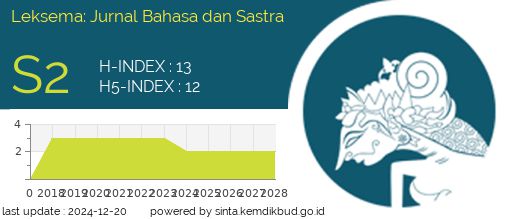PERSUASIVE HEDGING STRATEGIES BETWEEN NATIVE AND NON-NATIVE AUTHORS OF ENGLISH JOURNAL ARTICLES
DOI:
https://doi.org/10.22515/ljbs.v3i2.1408Keywords:
journal article, native, strategies, hedgesAbstract
Writing journal articles is the most scientific way to publish new research to public. Authors’ strategies to convince the readers are important to show their stance and viewpoint on the research. This study compares the strategies chosen by native and non-native English authors of journal articles in hedging their stances. The data were hedging strategies written in 50 randomly selected international journal articles, 25 of which were written by native English authors and 25 others by the non-natives. The result shows some differences in the use of hedges. Native authors show higher frequency in the use of writer-oriented hedges whereas non-native authors had higher frequency in reader-oriented hedges. This study also finds authors’ styles to persuade the readers.
Downloads
References
Meadows, AJ (ed). 1979. The Scientific Journal. London: Aslib
Amarasinghe, Amala Dilani. 2012. “Facework Strategies of Sri Lankans Working in Australiaâ€. Journal of Intercultural Communication Research, (41) 2: 193-215, DOI: 10.1080/17475759. 2012.692333
Crystal, David. 1997. English as a Global Language. London: British Library
Dobs, Abby Mueller & PilarGarcés-Conejos Blitvich. 2013. “Impoliteness in Polylogal Interaction: Accounting for Face-threat Witnesses’ Responsesâ€. Journal of Pragmatics, 53 : 112-130
Hyland, K. 1998. Hedging in Scientific Research Articles. Amsterdam: John Benjamin Publishing Company.
Kılıçkaya, Ferit. 2010. “The Pragmatic Knowledge of Turkish EFL Students in Using Certain Request Strategiesâ€. Gaziantep Ãœniversitesi Sosyal Bilimle r Dergisi, 9 (1): 185-201
Lakoff, G. Hedges. 1972. “A Study in Meaning Criteria and the Logic of Fuzzy Concepts†in
P. Peranteau, J. Levi & G. Phares (eds.). Papers from the Eighth Regional Meeting of the Chicago Linguistic Society 1972.
Mauko, Ida. 2014. The Native Speaker of English: A Clash of Conceptualizations. (Pro Gradu Thesis). Helsinki: University of Helsinki
McKinnon, Sean and Pilar Prieto. 2014. “The Role of Prosody and Gesture in the Perception of Mock Impolitenessâ€. Journal of Politeness Research 2014, 10 (2): 185-219. DOI 10.1515/pr-2014-0009
Pellby, Ellen Player. 2013. Hedging in Political Discourse: An Analysis of Hedging in an American City Council. (Bachelor Thesis).
Gavle: Gavle University
Stemler, Steve. 2001. “An Overview of Content Analysisâ€. Practical Assess-ment, Research & Evaluation, 7 (17) <http://PAREonline.net/getvn.asp?v=7&n=17>. Accessed July 9, 2015
Sundquist, Colleen Neary. 2013. “The Use of Hedges in the Speech of ESL Learnersâ€. Elia, 13: 149-174
Takahashi, Satomi. 2014. “The Effects of Learner Profiles on Pragmalinguistic Awareness and Learningâ€. System 48 (2015) 48e61. DOI:10.1016/j.system. 2014.09.004
Wang, Xin. 2014. “A Cognitive Pragmatic Study of Rhetorical Questionsâ€. English Language and Literature Studies, 4 (1)
Wijayanto, Agus. 2014. “Variability of Refusal in L2: Evidence of L1 Pragmalinguistic Transfer and Learner’s Idiosyncratic Usageâ€. International Journal of Applied Linguistics. DOI: 10.1111/ijal.12081
Yates, Lynda & George Major. 2015. “Quick-Chatting, Smart Dogs, and How to Say Without Saying: Small Talk and Pragmatic Learning in the Communityâ€. System 48 (2015) 141e152. DOI:10.1016/j.system.2014.09.011
Yue, Siwei & Xuefei Wang. 2014. Hedges Used in Business Emails: A Corpus Study on the Language Strategy of International Business Communication Online. Guangzhou: Guangdong University of Education.
Yule, George. 1996. Pragmatics. Oxford: Oxford University Press
Downloads
Published
Issue
Section
License
The copyright of the received article shall be assigned to the publisher of the journal. The intended copyright includes the right to publish the article in various forms (including reprints). The journal maintains the publishing rights to published articles.
In line with the license, the authors and users (readers or other researchers) are allowed to share and adapt the material only for non-commercial purposes. In addition, the material must be given appropriate credit, provided with a link to the license, and indicated if changes were made. If authors remix, transform or build upon the material, authors must distribute their contributions under the same license as the original.






